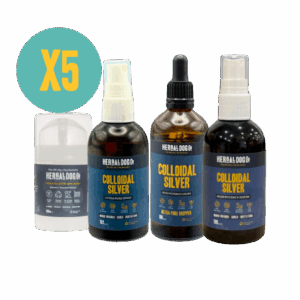A lot of dogs in the UK itch. A whopping 2-3 million dogs visit their vet for itchy skin each year.
Why do dogs get itchy
Itching can be divided into three leading causes: Parasites, Allergies & Sensitivities and Infections. Fleas and mange mites, and maybe Harvest Mites in the Autumn are common parasites. (See our blog on herbal flea products for more info.) Allergies and sensitivities, the second group, come in four varieties: outdoor (e.g. tree and grass pollens), indoor (e.g. house dust, house dust mite) food and contact allergies (where a metal collar, for example, provokes a local reaction on the dog’s neck). Skin infection, the third of our three causes of dog itch, usually happens when the skin is devitalised, often due to scratching and licking because of the first two causes – parasites and allergies/sensitivities.
Dog natural itch remedies
Herbs can help in several ways with the itchy dog. The approach to itch depends on the herbalist/herbal vet, but will often cover these five areas:
1. Ensure optimal liver, kidney and skin function to ensure toxins in the organs and blood are minimised, reducing irritation and inflammation.
2. Depuratives are employed to cleanse organs and skin further.
3. Ensure optimal blood supply to the skin.
4. Use of calming and anti-itch herbs to reduce discomfort and damage, and
5. Immunomodulatory herbs to moderate allergic/sensitivities.
- Organ support: Common herbs for liver, gut and kidney support include Milk Thistle, Dandelion, Schizandra, Bupleurum, Camomile, Boswellia, Fennel or Caraway. https://herbaldogco.com/product/liver-support/
- Depuratives to ‘clean the blood’: Galium aparine, Clivers or Goose Grass, Rheum palmatum Rhubarb root, and Red Clover, Trifolium pretense, have been used in the human herbal tradition for centuries. Burdock, Arctium lappa, is often thought of for use, in short, 4-6 week periods where mild infection is suspected. It is known as the ‘JCB digger’ of the herb world, able to excavate through infection. https://herbaldogco.com/product/allergy-support-powder/
- Ensuring blood to the skin is essential for best oxygen supply, but also to supply anti-inflammatory nutrients and remove inflammatory mediators and toxins. https://herbaldogco.com/product/herbal-dog-co-furbalisious-skin-and-fur-blend/
- Herbs to reduce itch: There are many. They may help itch, regardless of the cause. However, it is better medicine to not simply use them without knowledge of why the dog is itching in the first place. For example, if your dog has mange, you can use as many anti-itch herbs as you like, but the mites will still be in place when you stop the course. Anti-itch herbs include traditional anti-allergic herbs like Albizia bark (Albizia lebbeck), Rehmannia (Rehmannia glutinosa) and Scutellaria baicallensis, baical skullcap root. Look for herb formulas containing some or all of these.
- Immunomodulator herbs are employed where there is an allergic or hypersensitivity element to the itch. For example, to grass pollens or house dust. Echinacea, Sage, Shiitake Mushroom, Reishi Mushroom and Chlorella are often chosen to nudge immunity. https://herbaldogco.com/product/immune-support/
If you have an itchy dog, first get a diagnosis. It will put you in a much stronger position to select appropriate herbs.




